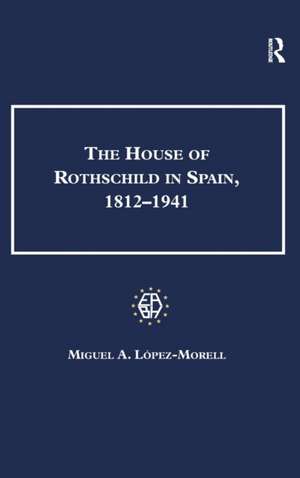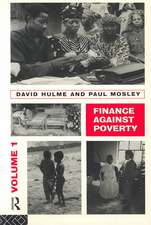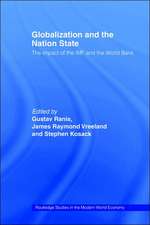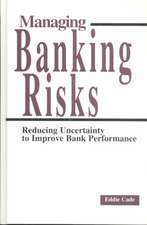The House of Rothschild in Spain, 1812–1941
Autor Miguel A. Lopez-Morellen Limba Engleză Hardback – 23 mai 2013
| Toate formatele și edițiile | Preț | Express |
|---|---|---|
| Paperback (1) | 469.34 lei 6-8 săpt. | |
| Taylor & Francis – 15 noi 2016 | 469.34 lei 6-8 săpt. | |
| Hardback (1) | 1129.71 lei 6-8 săpt. | |
| Taylor & Francis – 23 mai 2013 | 1129.71 lei 6-8 săpt. |
Preț: 1129.71 lei
Preț vechi: 1377.68 lei
-18% Nou
Puncte Express: 1695
Preț estimativ în valută:
216.18€ • 226.74$ • 179.96£
216.18€ • 226.74$ • 179.96£
Carte tipărită la comandă
Livrare economică 01-15 aprilie
Preluare comenzi: 021 569.72.76
Specificații
ISBN-13: 9780754668008
ISBN-10: 0754668002
Pagini: 492
Dimensiuni: 156 x 234 x 27 mm
Greutate: 1.04 kg
Ediția:Revised
Editura: Taylor & Francis
Colecția Routledge
Locul publicării:Oxford, United Kingdom
ISBN-10: 0754668002
Pagini: 492
Dimensiuni: 156 x 234 x 27 mm
Greutate: 1.04 kg
Ediția:Revised
Editura: Taylor & Francis
Colecția Routledge
Locul publicării:Oxford, United Kingdom
Cuprins
Contents: Prologue to the English edition; Introduction; Early contacts and failed attempts to set up in Spain, 1812-1833; Liberalism, corruption and war finances.1833-1840; The contradictions of peace: financial problems of the state and the first moves towards modernity, 1840-1855; Financing the railways; Years of financial euphoria and crisis, 1856-1868; The great operations of the sexenio; The Rothschilds' waning importance in public finances, 1874-1900; The industrial investments,1874-1913; The first symptoms of the end of an investment model; The slow journey towards the end of the Rothschild investments in Spain; Fundamentals of the Rothschilds' activities in Spain; The consequences of the Rothschild years, 1812-1941; Appendices; Bibliography; Index.
Recenzii
'López-Morell has undoubtedly produced the most comprehensive study to date of Rothschild undertakings in Spain ... Near encyclopedic in scope, it is in some respects a history of nineteenth-century Spanish public finances and of the development of railways and the mineral extractive industries in that country. Anyone seeking information on Spain and the house of Rothschild will undoubtedly turn first to this volume. It is, indeed, a tour de force of research in both primary and secondary sources.' Business History Review 'This is an important book. Some episodes of the history of the House of Rothschild in Spain have been previously analysed, but until the appearance of this book ... we did not have a complete picture of the subject.' Economic History Review 'López-Morell's book is a very detailed, fine-grained narrative of the workings and withdrawal of one of the most prominent international financial houses in Spain during a crucial and often misunderstood period in the country's history ... The archival work behind the book is truly painstakingly done and the wealth of empirical information collected transpires in every page.' Journal of Economic Literature 'An immensely thorough piece of research ... López-Morell has undoubtedly produced the most comprehensive study to date of Rothschild undertakings in Spain ... near encyclopedic in scope ... Anyone seeking information on Spain and the house of Rothschild will undoubtedly turn first to this volume. It is, indeed, a tour de force of research in both primary and secondary sources.' Business History Review ’...an insightful book for any scholar interested not only in nineteenth-century finances and international business, but also in the details of European industrialization.’ EH.Net
Descriere
Amongst the ranks of capitalists who drove European industrialisation in the nineteenth century, the Rothschilds were amongst the most dynamic and the most successful. Whilst their business interests were of a global nature, this book explores the specific case of Spain, where the House of Rothschild had extensive investments, particularly in the mining and railway sectors. By exploring crucial questions regarding the structure, extent and impact of the Rothschilds Spanish operations, not only do we learn much more about the working of one of the leading financial institutions and the development of the Spanish economy, but a greater understanding of the broader impact of international finance and the flow of capital in the nineteenth century is achieved.







